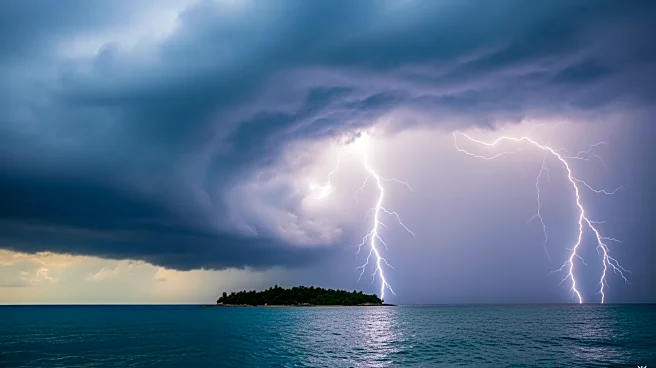What's Happening?
Hurricane Melissa is rapidly intensifying as it approaches Jamaica, with forecasts predicting it could become the strongest storm ever recorded on the island. The National Hurricane Center has issued warnings of catastrophic flash flooding and landslides,
particularly affecting Jamaica and southern Hispaniola, which includes Haiti and the Dominican Republic. The storm, currently moving west-northwest at 1 mph, is expected to reach Category 4 strength. Jamaican officials have announced the closure of all airports starting at 8 p.m. on Saturday, with only delayed flights allowed to land. The storm has already resulted in the deaths of at least three people in Haiti due to flooding and landslides.
Why It's Important?
The potential impact of Hurricane Melissa on Jamaica and surrounding regions is significant, with the storm poised to deliver unprecedented rainfall and wind damage. The economic and infrastructural implications for Jamaica could be severe, affecting tourism, agriculture, and local communities. The storm's progression also poses a threat to Haiti and the Dominican Republic, where infrastructure is already strained. The humanitarian impact is considerable, with potential for widespread displacement and resource shortages. The situation underscores the vulnerability of Caribbean nations to extreme weather events, highlighting the need for robust disaster preparedness and response strategies.
What's Next?
As Hurricane Melissa approaches, emergency services and government agencies in Jamaica and neighboring countries are on high alert. Evacuation plans and emergency shelters are being prepared to accommodate those in high-risk areas. The international community may also mobilize to provide aid and support in the aftermath of the storm. Monitoring of the storm's path and intensity will continue, with updates from meteorological services guiding response efforts. The focus will be on minimizing loss of life and mitigating damage to infrastructure and livelihoods.
Beyond the Headlines
The intensification of Hurricane Melissa raises broader questions about climate change and its role in the increasing frequency and severity of tropical storms. The Caribbean region, with its unique geographical and economic challenges, faces ongoing risks from such natural disasters. This event may prompt renewed discussions on climate resilience, sustainable development, and international cooperation in disaster risk reduction. The storm also highlights the importance of early warning systems and community engagement in disaster preparedness.
















